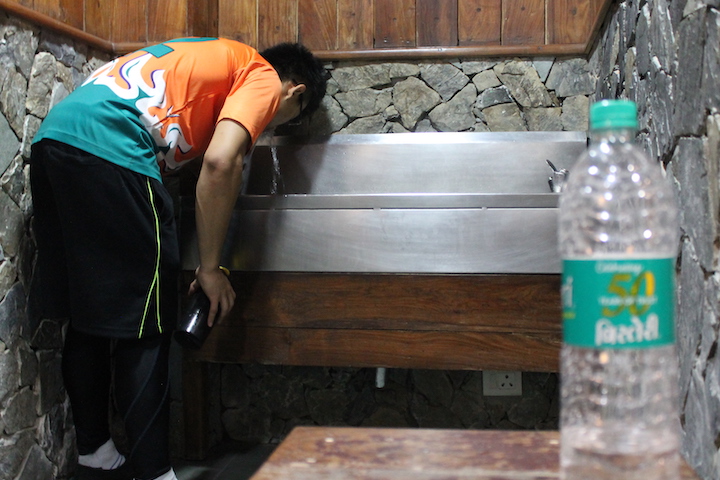
20 Sep Don’t Bottle it Up
While every logical, environmental, and financial argument goes against bottled water, people still buy it. Daeun Lee from the Class of 2020 asks why.
As I observed how my Instagram feed was being painted with dying turtles and choking marine animals, I wondered if those images motivate people enough to make a change. Having to encounter numerous occasions where my peers bleated—on the inconvenience of having to walk so much or about the food—despite the fact that we are in a privileged place made me wonder if people care.
They should care.
In the 2019 Festival of Ideas, an annual Upper Years event, I presented my Interdisciplinary Project which was on potential health hazards of PET bottles. Following up on this, I went around campus to ask people whether they would be interested to join the movement of baning Bisleri bottles. One of the first responses were:
“Bisleri bottles are more convenient.”
This was when I realized that I am not fighting for the ban of Bisleri bottles around campus nor against unyielding students. It was the facade of convenience that plastic bottles put up to hide their impact on the environment and us. It was against the propaganda of dirty tap waters that the big corporations are trying to instill in the market — the consumers — through media.
Since the late 19th century, plastic waste has been brought into attention. People have been warned, alarmed, and talked to regarding plastic waste and their environmental implications. Despite this, the egotistical argument:
Comfort
Alongside apathy and the dismissal attitude regarding the environment seemed to have banished the path of what is right, in favor of what is easy. In the earlier years, this reaction towards plastics, in general, was to blame the corporations for establishing apparent images of PET bottles meeting up to the infinite demand and the ecstasy of convenience to equivocate the crowd. However, with numerous warnings that have been shared with the crowd gives us no excuse or the place to give the benefit of the doubt to use PET bottles.
Regarding the environment, one of the most critical points that need to be emphasized is leachates — any type of fluid leaching landfills which is generated from liquids present in the waste. When plastic bottles are thrown into landfills or dumped around, toxic chemicals that are in the plastic leach out from it to the surrounding areas. This happens because PET bottles are made of type 1 plastic which indicates that they are more porous in nature, therefore, much easier for the chemicals to be transferred from the plastic to its environment. What this means to Mussoorie and India, in general, is that our water sources that are already limited are going to be contaminated. Nearly 85% of the drinking water in India is from aquifers, the underlying groundwater sources.
Chennai, a city in southern India, already ran out of water.
India is speedily running out of the water and with the current rate of urbanization and exploitation of the aquifers nature will not only be defeated by human cruelty but also by the convenience that so many of us desire to pursue.
We should not pollute the little that is remaining.
These news articles and talks that we keep hearing around us regarding plastic waste is not a farfetched concept. At times, we may feel disconnected from the events around us since our main source is a rectangular digital screen. However, we should stop excusing ourselves out of those crises and pretend that we are not related — just because it is easier to ignore a problem rather than acting upon it.
As a metaphysical poet John Donne said, “every man is a piece of a continent, a part of the main,” we cannot incarcerate ourselves into your convenience box thinking that the box will last when the world around that it is falling into a catastrophe. We cannot pretend that we do not see nor hear the way the environment is being impacted. Most of all, we cannot YOLO our lives giving into the benefit of the doubt and risk our habitat. In the long run, our future. We should not rest or abide by the momentary pleasures that we tend to seek.
Since, living also means to see beyond ourselves, as we are part of something bigger than ourselves.
Daeun Lee, Class of 2020, is the staff reporter of The Woodstocker






Suraj Rathod
Posted at 15:58h, 16 NovemberHey,
It was amazing to go through your post,
that was really so useful and informative!